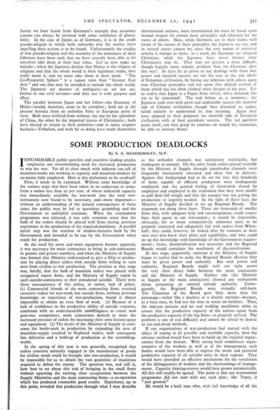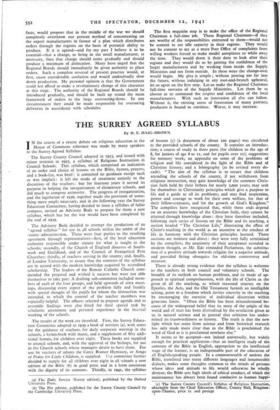SOME PRODUCTION DEADLOCKS
By S. S. HAMMERSLEY, M.P.
INNUMERABLE public speeches and countless leading articles emphasise our overwhelming need for increased production to win the war. Yet all in close touch with industry can tell of munition-works not working to capacity and munition-workers by no means fully employed. How is this dichotomy to be resolved?
First, it needs to be explained. Without some knowledge of the various steps that have been taken in an endeavour to trans- form a nation less than ro per cent. of whose industrial capacity was immediately available for war-work into the total war- instrument now found to be necessary, and—more important— without an understanding of the natural consequences of these steps, the public may be led to querulous grumbling and the Government to unhelpful reactions. When the rearmament programme was initiated, it was only common sense that the bulk of the orders should be placed with firms having previous experience in the production of the required munitions. A parallel initial step was the erection of shadow-factories built by the Government and intended to be run by the Government when ready for production.
As the need for more and more equipment became apparent, it was necessary for main contractors to bring in sub-contractors in greater and greater numbers, and when the Ministry of Supply was formed that Ministry endeavoured to give a fillip to produc- tion by placing direct orders with outside firms willing to turn over from civilian to war production. The position at that stage was, briefly, that the bulk of munition orders was placed with recognised expert firms, and the Ministry of Supply roped in such outside-contractors as they considered suitable. There were three consequences of this policy, or rather, lack of policy. 00 Commercial friends of the main contracting firms received excessive orders for war-work, but outside firms, without previous knowledge or experience of war-production, found it almost impossible to obtain an even flow of work. (2) Because of a lack of confidence in the productive ability of outside concerns, combined with an understandable unwillingness to create new post-war competitors, main contractors desired to meet the increased pressure of orders by increasing their own factory-space and equipment. (3) The desire of the Ministry of Supply to over- come the bottle-neck in production by expanding the area of munition-supply resulted in ill-placed orders, with consequent late deliveries and a hold-up of production at the assembling- works.
In the spring of this year it was generally recognised that unless concerns normally engaged in the manufacture of goods for civilian needs could be brought into war-production, it would be impossible for us to obtain the vast quantities of munitions required to defeat the enemy. The question was, and still is, how best to set about this task of bringing in the small firms without upsetting the existing close co-operation between the Supply Ministries and the main contracting firms—a co-operation which has produced reasonably good results. Experience, up to this point, revealed that production through what I may describe as the orthodox channels was satisfactory technically, but inadequate in amount. On the other hand, orders placed centrally by the Ministry of Supply through unorthodox channels were frequently inaccurately executed and often late in delivery. Against this background had to be set the fact that hundreds of firms capable of efficient production were inadequately employed, and the general feeling of frustration shared by employers and employed in the realisation that they were unable to pull their full weight and that the country was not getting the production so urgently needed. In the light of these facts the Ministry of Supply decided to set up Regional Boards. The argument ran along these lines: There are thousands of smaller firms that, with adequate help and encouragement, could contri- bute their quota to our war-output ; it would be impossible, obviously, for so many comparatively unknown units to be properly contacted and adequately fed with orders from White- hall ; they could, however, be looked after by someone in their own area who knew their plant and capabilities, and who could tie up this knowledge with knowledge of the Government require- ments ; hence, decentralisation was necessary and the Regional Boards would constitute the machinery of decentralisation.
At this stage, apparently, someone at the Ministry of Supply began to realise that to make the Regional Boards effective they must be given power and authority. But with power and authority, Regional Boards might well cut right across the very close direct links between the main contractors and the Ministry of Supply. Neither side (the Ministry of Supply or the main contractors) showed any enthusiasm about promoting an untried outside authority. Conse- quently, the Regional Boards were virtually still-born. The Chairman of the Board gave little more than his patronage—rather like a duchess at a charity matinee—because, as a busy man, he had not the time to waste on futilities. Thus, the impasse remains and no real working machinery exists to ensure that the productive capacity of the nation—apart from the productive capacity of the big firms—is properly utilised. The problem is one of real difficulty and cannot be solved by drastic or cut-and-dried methods.
If our organisations of war-production had started with the object of roping in all possible and available capacity, then the obvious method would have been to build up the regional organi- sations from the bottom. With strong local committees repre- sentative of the workers as well as of the management, such bodies would have been able to express the needs and potential productive capacity of all suitable units in these regions. They would have provided an effective mechanism for the ventilation of the delinquencies of workers and the shortcomings of manage- ments. Capacity clearing-centres would have grown automatically. All this will readily be agreed. The point is that our rearmament programme did not start with any such plan ; like Topsy, it " just growed:" He would be a bold man who, with full knowledge of all the facts, would propose that in the middle of the war we should completely overthrow our present method of concentrating on the expert manufacturers in favour of a plan which distributes orders through the regions on the basis of potential ability to produce. If it is agreed—and for my part I believe it to be essential—that a change, to bring in the small manufacturer, is necessary, then that change should come gradually and should produce a minimum of dislocation. Many have urged that the Regional Boards should immediately be given authority to place orders. Such a complete reversal of present practice would, at first, cause considerable confusion and would undoubtedly slow down production. My personal opinion is that the Government could not afford to make a revolutionary change of this character at this stage. The authority of the Regional Boards should be introduced gradually, and should be built up round the main framework of orders to the large contracting-firms. In any circumstances they could be made responsible for overseeing deliveries in accordance with schedules.
The first requisite step is to make the office of the Regional Chairman a full-time job. These Regional Chairmen—if they are worthy of the responsibilties entrusted to them—would not be content to see idle capacity in their regions. They would not be content to act as a mere Post Office of complaints from willing workers forced to make model aeroplanes to while away the time. They would deem it their duty to look after their regions and they would do so by gaining the confidence of the larger manufacturers and by working from inside the Supply Ministries and not from outside. In these ways the change-over would begin. My plea is simple ; without peering too far into the future, without indulging in any root-and-branch upheaval, let us agree on the first step. Let us make the Regional Chairmen full-time servants of the Supply Ministries. Let them be so chosen as to command the respect and confidence of the local manufacturers. With such an innovation all else can follow. Without it, the existing sense of frustration of many patriotic producers is bound to continue. Worse, it may increase.



























 Previous page
Previous page